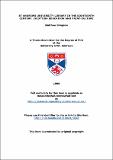Files in this item
St Andrews University Library in the eighteenth century : Scottish education and print-culture
Item metadata
| dc.contributor.advisor | MacLachlan, Christopher | |
| dc.contributor.author | Simpson, Matthew | |
| dc.coverage.spatial | 416 | en_US |
| dc.date.accessioned | 2011-05-24T14:04:07Z | |
| dc.date.available | 2011-05-24T14:04:07Z | |
| dc.date.issued | 1999 | |
| dc.identifier.uri | https://hdl.handle.net/10023/1848 | |
| dc.description.abstract | The context of this thesis is the growth in size and significance of the St Andrews University Library, made possible by the University's entitlement, under the Copyright Acts between 1709 and 1836, to free copies of new publications. Chapter I shows how the University used its improving Library to present to clients and visitors an image of the University's social and intellectual ideology. Both medium and message in this case told of a migration into the printed book of the University's functions, intellectual, spiritual, and moral, a migration which was going forward likewise in the other Scottish universities and in Scottish culture at large. Chapters II and III chart that migration respectively in religious discourse and in moral education. This growing importance of the book prompted some Scottish professors to devise agencies other than consumer demand to control what was read in their universities and beyond, and indeed what was printed. Chapter IV reviews those devices, one of which was the subject Rhetoric, now being reformed to bring modern literature into its discipline. Chapter V argues that the new Rhetoric tended in fact to confirm the hegemony of print by turning literary study from a general literary apprenticeship into the specialist reading of canonical printed texts. That tendency was not without opposition. Chapter VI analyses the challenge from traditional oral culture as it was expressed in the marginalia added to the Library books at St Andrews University by its students, and argues that this dissident culture helped to form the voice of the poet Robert Fergusson while he was one of those students. Chapter VII goes on to show how Fergusson used that voice to warn his countrymen of the threat which print represented to their culture, and to show how it might be resisted in the interests of both literature and conviviality. | en_US |
| dc.language.iso | en | en_US |
| dc.publisher | University of St Andrews | |
| dc.title | St Andrews University Library in the eighteenth century : Scottish education and print-culture | en_US |
| dc.type | Thesis | en_US |
| dc.type.qualificationlevel | Doctoral | en_US |
| dc.type.qualificationname | PhD Doctor of Philosophy | en_US |
| dc.publisher.institution | The University of St Andrews | en_US |
This item appears in the following Collection(s)
Items in the St Andrews Research Repository are protected by copyright, with all rights reserved, unless otherwise indicated.

